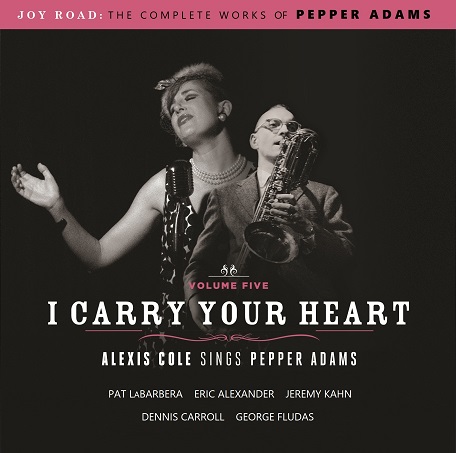
In 1984, I’d met Pepper and in l985 we were scheduled to do a performance at the Great Hall of Cooper Union. I visited him - already ill with the cancer that would soon take his life - at his house in the Canarsie section of Brooklyn. We rehearsed my poems with his playing and everything felt just right, including talking with him about James Joyce. Pepper was an impassioned reader, a multi-dimensional man. Sadly, our reading/performance never took place; he went into the hospital weeks before the date and died not long after. Meanwhile, Gary was at work on his MA in English and I was an adviser for his thesis - on the life of Pepper Adams. That was a long time ago, but his interest, and his engagement in Pepper’s music continues.
When Gary asked me if I’d like to write the lyrics for a group of Adams’ ballads - not for money but for wine - I was excited and a little intimidated. A few years ago he told me about his project - to record a boxed set of Pepper’s music, played by contemporary artists. Gary mentioned that Pepper had always wanted someone to come up with lyrics for his ballads, and he asked if I’d try my hand at writing them.
I work a lot with jazz players and composers, but usually the words come first and then some music is either written or improvised to fit the words. I’ve never set words to pre-existing music, so this was as much of a challenge as it was an honor to have been asked. Not being able to read music (teenage trumpet lessons long gone) I had to rely on tapes of the melody laid out simply on the piano. Adam Birnbaum, my favorite piano player to work with, played and recorded Pepper’s melodies for me. I took the recordings home, tried to fit words onto the notes, returned to Adam, and we then adjusted my words and their fittings, then I took the new version home and reworked that. The process went on this way until I had all seven of the lyrics done and ready to be tested on the voice of Alexis Cole. After sitting down with Alexis, a wonderful singer no matter what the material might be, we adjusted the words even further. Each step of this lengthy revision process improved what would turn out to be singable songs. This was a laborious process, but, by the end, so satisfying! I am grateful to Gary for bringing me back to Pepper Adams and prompting me to move my poetic urge even closer to - or right up against - such songs as “Julian” or “Civilization and Its Discontents.” Thanks to Pepper’s good titles, and Gary’s background information about them, I was able to make up stories or fragments of stories. These were, along with the melodies, of course, the main inspirations for each song.
Barry Wallenstein
At his gracious, old world Manhattan apartment, he’d pour us an afternoon drink and I’d play through the songs on his plunky piano, two or three per session, looking line by line, and rearranging them as minimally as possible to make them more singable. I wasn’t a total fan of the lyrics at first, because they were so different and obscure. But, later, I realized they’re not trying to be normal lyrics. They’re poems. Then I started reading more about Pepper, and the inspiration for the songs, and I learned that he loved literature; and that most of his tunes were inspired by and named after poems or stories. It all came into sharp focus. I realized Gary Carner’s genius in commissioning the lyrics from Barry, and really began appreciating them in a new way.
The best thing about these songs is how they roll over you in waves. Like any great work of art, with time and a deep level of engagement, they blossom as you explore them further. Pepper’s incredibly beautiful and complex melodies, the ambiguous and moody lyrics of Barry Wallenstein, and the wonderful performances of the musicians that brought them to life all culminate in a true artistic experience of depth and passion.
Alexis Cole
I quickly decided that I would marginalize these concerns and do what was necessary to make the session a success. The three musicians I hadn’t met (vocalist Alexis Cole, and saxophonists Pat LaBarbera and Eric Alexander) were obviously of the highest caliber, so I was excited to cross paths with them. Drummer George Fludas had done my other two Pepper dates and would provide me with a known commodity - and an extremely valued one! Bassist Dennis Carroll is a fixture on the Chicago scene, and I always enjoy playing with him. In addition, Dennis and George have worked a million gigs together and they really have a collective “thing.” The bass/drums connection can make or break a date, and I knew these guys would bring creativity, clairvoyance, and support to this musical setting. So I set to my task: writing arrangements that would groove (but be slow enough to get the lyrics across), that would have room for solos (divided up in an equitable fashion), and that could be recorded after a few minutes of rehearsal (with horn players whose reading abilities were a complete unknown to me). Piece of cake, right? Or, as they say in France, morceau de gateau?
I’m pleased to report that everything went very smoothly. Everyone got along very well, focusing on the task at hand. Pat and Eric chatted nonstop about horns, reeds, ligatures, etc., right up until about two seconds before the start of each take, proving once again that reed players never run out of stuff to talk about. I’m very proud of the music that emerged from the session. We didn’t “dumb-down” the material, yet I think that the results are accessible. It just goes to show that good things can happen if you keep your mind tuned to the right channel. But here’s my question: Is there a patron saint who oversees the successful interpretation of Pepper’s music? Perhaps it’s St. Capsicum?
Jeremy KahnPoet’s Notes - Barry Wallenstein
When I was a teenager and into my twenties during the ’50s and ’60s, jazz was the music for the young as well as for the old. Now definitely not young, I look back on a life enriched by jazz. Many of the poems I’ve written over the years are influenced by jazz, and some are half-way towards song. My first public reading, c. 1961, was, unbelievably, with the jazz accompaniment of Charles Mingus. I was 19 at the time and in awe of the great bassist. Almost fifteen years later I recorded my first LP, with another fine bassist, Cecil McBee, and the pianist Stanley Cowell. At the same time, I was finishing my Ph.D. in literature and was an adjunct professor of literature and writing at City College of New York. One of my better students was Gary Carner, a true enthusiast of jazz, who at the time was playing guitar and who introduced me to sax master Pepper Adams.
April 2012Vocalist’s Notes - Alexis Cole
I was so excited when I was asked to work on the Pepper Adams project. I didn’t know much about his music at first, which is, of course, part of the need for Gary’s five volume set! But the idea of helping bring to life new, original lyrics to songs that people have never sung before was an exciting prospect. The more I delved into it, learning the songs, and working with Barry Wallenstein, the more excited I became. It was actually a very collaborative process, through which I was able to shed a lot of my preconceptions about what I’d thought lyrics should be. Working together, we gently shook out Barry’s poetic velveteen cloak, so it laid right on the form of the melodies. I’d go through the songs at home, circling the parts where things were a little awkward or clunky, and then bring them to Barry.
April 2012Leader & Arranger’s Notes - Jeremy Kahn
When producer Gary Carner offered me the opportunity (for a third time) to lead another of his recording sessions designed for the sole and admirable purpose of breathing new life into Pepper Adams’ compositional legacy, I was, of course, intrigued. As I recall, Gary described his concept to me: Pepper’s seven lovely ballads had been set to words by a poet who had been Gary’s college teacher. My job was to arrange all but two of them into non-ballad formats. To further complicate things, Gary proposed adding two tenor saxophonists (recalling classic tenor battles like Stitt/Ammons and Lockjaw/Griffin), and he had specific arranging ideas, though he graciously told me to use or ignore any of them. Intrigued and excited, yes, but my mind also turned to potential pitfalls. First, was the odd position of being the leader of a date for which the personnel, and tunes, had been decided by someone else. Next, was fear of the unknown. I hadn’t met half the band, they lived about a thousand miles away, and we’d be meeting for the first time on the day of the first recording session. Budgetary considerations made rehearsing impossible. How should I handle writing arrangements for musicians whose reading abilities were completely unknown to me? Plus, at six pieces, this was going to be the largest ensemble of my three Pepper projects, and the more people involved means more things can go wrong. Right?
March 2012

